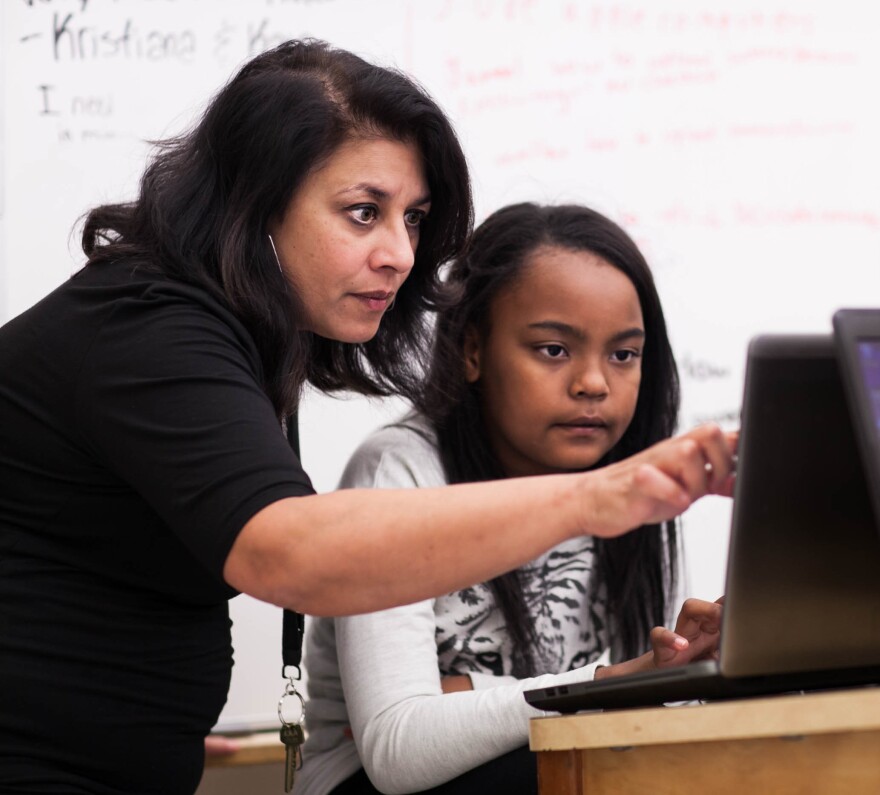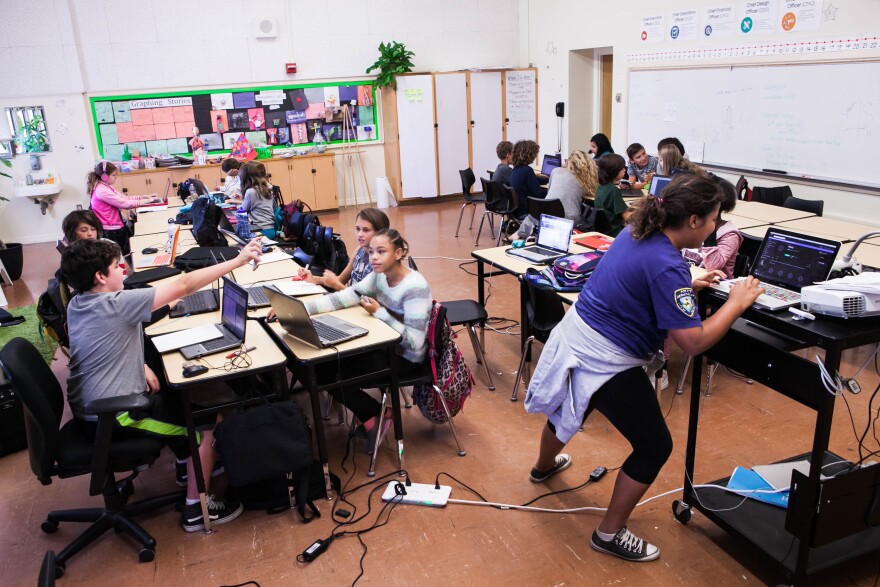Our Ideas series is exploring how innovation happens in education.
Fourteen-year-old Yasemine Dursun is an aspiring entrepreneur. Her invention is called the Slapwrap, a braceletlike device for storing earbuds.
In a cacophonous hallway crowded with her classmates, she launches into her pitch:
"If you're washing your hands, water can get on your buds and damage them," the ninth-grader explains. "They can dangle and pick up dirt. This is kind of disgusting, but it can cause acne."
Yasemine came up with her idea for keeping earbuds stored and neat in a class at the Incubator School, a new public school in Los Angeles that focuses on STEM, entrepreneurship, gaming and a collaborative approach to learning.
It's not a charter school — it's one of several dozen experimental "pilot" schools around the city.
This one has about 200 students in grades six to nine. It shares a huge, rundown, mazelike campus with several other regular public schools near Los Angeles International Airport.

According to the website of the LA teachers union: "Pilot schools are given charter-like freedoms and are expected to be models of educational innovation. They are also expected to serve as research and development sites for effective urban public schools."

Founder Sujata Bhatt also teaches the sixth-grade humanities course. On the day of my visit, these students are working in groups, using the game Minecraft to build a historically accurate environment for a particular Neolithic or Paleolithic people.
"I really like this history project," says Ahad Lakhani, a well-spoken sixth-grader with glasses. "If I went to any other school I wouldn't play Minecraft for a grade. And I feel like this teaches us to collaborate."
Some members of his group do research; others troubleshoot the technology. Ahad , as it turns out, once visited the archaeological sites of the tribe his group is working on, on a family trip back to Pakistan. So he's able to contribute some firsthand knowledge.
"This is graded as a group and it's also graded individually," he says. "So you really have to choose well and work with your group. And everything can't be your way. That's what I've learned."
The classrooms I visit are humming with students on task, generally in groups. They demonstrate a great love for technology — and a big awareness of the 21st century skills the school emphasizes, like collaboration, communication and "growth mindset."

One student in the Minecraft group takes out his phone and videotapes me interviewing them. "I take videos a lot in class," he says. "Like in our 3-D printing class, I film the whole thing. So if I mess up I can go back and know what I did wrong."
A couple of ninth-graders run the school's Instagram account: They've photographed, uploaded and tagged me by the time I leave. I also chat with more entrepreneurial students — like Heidi Mendez, an eighth-grader who used her budding coding and graphic-design skills to design a logo and build a website for her mother's pet grooming company .
And Armaan Ismail, a ninth-grader who's partnered with a girl from another school to create Guardian Locket, a small pendant that works like a panic button, sending a series of discreet emergency texts in case of danger.
Bhatt, a teacher for more than a decade, got excited about experimenting with new ways of learning, technology and entrepreneurship when she took a side job consulting with a startup on the development of an educational iPad app.
She continues to experiment, update and overhaul the curriculum each year, changing up everything from course offerings to the software used on every student's laptop. (One student complaint: It's confusing switching back and forth between Google Classroom and a newer course platform, Chalkup).
Currently, the teaching team is working to find balance among learning that captures students' passions; making a broader impact on society; and covering the academic basics, as well.
"I don't believe that children always know exactly what they want to study," says Ryan Oliver, a newer arrival who teaches entrepreneurship. "They love what they know. They don't necessarily know what they love."
As it expands into the high school grades — adding 10th grade next year — the Incubator School seeks to prepare students not just for college, but for self-directed learning — what the school calls "uncollege."

And directly to entrepreneurship if students choose that instead.
"We want to offer rigor, creativity and freedom," says Bhatt, whose own son is currently taking a gap year after high school.

It's not an easy undertaking. The air conditioning is barely functioning when I visit and the classrooms are dingy.
Bhatt has had high staff turnover the past three years as she seeks teachers willing to go along with her unorthodox approach. And a high school she initially approached about sharing its location rejected the school amid parent concerns about the business focus.
One of the biggest challenges has been the school's demographics, in an unexpected way.
"We want to do network integration of high-SES and low-SES kids," she says — referring to the academic term for socioeconomic status. "It starts with getting the kids comfortable. One of our kids had a bar mitzvah a couple weeks ago and you saw it in the pictures on Instagram. Everyone was there. Every race, class, background, religion. You don't see that in LA."

But the current balance may not last. While initially she thought Incubator's challenge would be to recruit more affluent students, many families of means have found the school's focus appealing. "Like a private school education at public school prices," she explains. Which means Bhatt has to work harder to preserve diversity — to ensure that working families and students from different backgrounds feel welcome there.
Transportation is one issue in this car-dependent city: The immediate area — historically low-income — is rapidly gentrifying, and her school doesn't have the funds to bus students in from farther away.
"We're fighting the tide, and it's heartbreaking," she says. "We need to organize and reach out to parents. A truly 21st century school is integrated."
Copyright 2021 NPR. To see more, visit https://www.npr.org.



